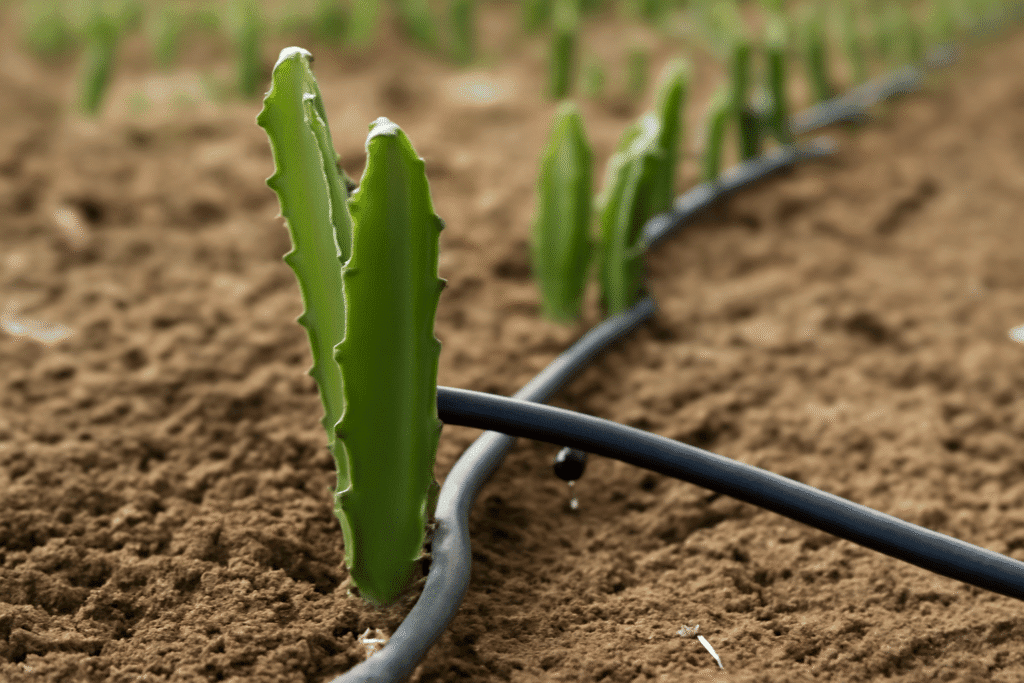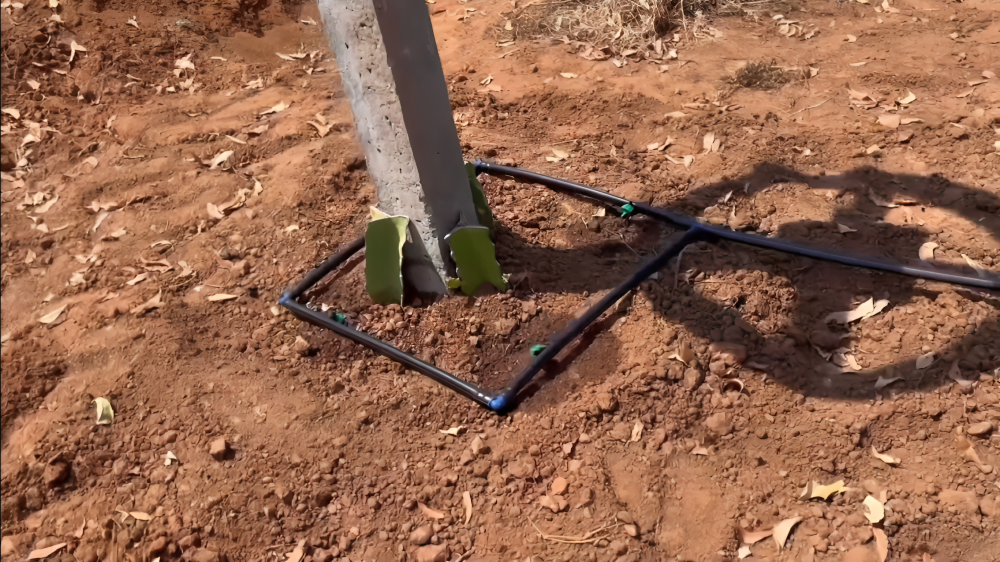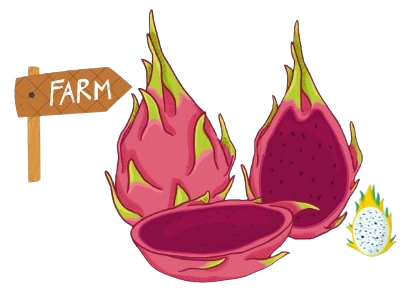Watering plays a vital role in the successful cultivation of dragon fruit. New farmers often struggle with determining the right amount of water for dragon fruit leaves, which can impact plant health and productivity. In this article, we will explore everything you need to know about dragon fruit watering, including the ideal water requirements, common mistakes, and the benefits of using a drip irrigation system for dragon fruit.
How to Determine the Right Dragon Fruit Watering?

Watering is crucial for the health of dragon fruit leave. However, determining how much water to give is not always straightforward, as it depends on various factors, including the type of soil and climate conditions. Here’s a step-by-step guide to help you understand the water requirements of dragon fruit plants:
- Soil Moisture Observation: The most reliable way to determine when to water is by checking the moisture content of the soil. If the soil is dry and cracks appear on the surface, it’s time to water. On the other hand, if the soil feels sticky and wet to the touch, avoid watering at that time.
- Watering Frequency Based on Seasons:
- Summer: During hot weather, it is recommended to water the dragon fruit plants every 4-5 days.
- Winter: In colder months, watering once every 7-8 days is usually sufficient.
- Soil Type Matters: Different soils have different moisture retention properties. Sandy or loamy soil tends to dry out faster and needs more frequent watering, while clay soil retains moisture longer, reducing the need for frequent watering.
- Plant Size and Water Needs: Smaller plants require less water, whereas larger dragon fruit need more water to grow properly. Ensure that water reaches the roots but avoid overwatering to prevent root rot.
Watering Dragon Fruit Leaves: Importance of Proper Irrigation

The dragon fruit are part of a cactus species that does not require excessive amounts of water. However, the plants do need adequate moisture to thrive. Here’s how to take care of them:
- Overwatering: One of the most common mistakes is giving too much water. Excess water can cause the plant’s roots to rot, leading to poor growth and even plant death.
- Underwatering: Similarly, not watering enough can cause the dragon fruit leaves to experience stress, leading to yellowing and stunted growth.
- Watering Time: The best times to water are early in the morning or in the evening. Watering during midday heat causes rapid evaporation, making it ineffective.
- Water Distribution: When watering, ensure that water reaches the roots thoroughly, but avoid waterlogging. Overwatering can lead to root rot, which is detrimental to the health of your plant.
Caring for Dragon Fruit in Different Seasons
Dragon fruit plants require different care based on the season. Here’s how you can manage watering in different weather conditions:
- Dry Seasons:
- Regular Watering: During dry spells, dragon fruit plants need consistent watering. However, ensure that the soil does not become waterlogged. A good practice is to use mulch to retain moisture in the soil.
- Mulching Benefits: Adding mulch or grass around the plants helps retain moisture and regulates soil temperature, which is beneficial for the plant’s growth.
- Rainy Seasons:
- Prevent Waterlogging: In the rainy season, it is essential to avoid water accumulation around the roots. Ensure the plant is planted in well-draining soil.
- Use of Plastic Covers: In case of excessive rainfall, using plastic covers or installing proper drainage systems can protect the plant from waterlogging and root rot.
Common Mistakes in Watering Dragon Fruit Leaves
New farmers often make several mistakes when watering dragon fruit. Here are some of the most common errors and how to avoid them:
- Overwatering: As mentioned earlier, overwatering can cause root rot. Ensure that water doesn’t accumulate in the soil and check drainage systems regularly.
- Incorrect Watering Time: Watering during the hottest parts of the day causes water to evaporate before the plants can absorb it. Stick to early morning or evening for optimal watering results.
- Inconsistent Watering: Dragon fruit plants need regular watering. If you water infrequently, the plant may experience stress, leading to poor growth and fruit production.
- Improper Drainage: If your soil doesn’t drain well, water can accumulate around the roots, causing rot. Use well-draining soil and ensure good drainage for healthy plant growth.
The Role of Drip Irrigation System for Dragon Fruit

A drip irrigation system for dragon fruit is an excellent solution for managing water effectively and ensuring that your plants get the right amount of moisture. This system is designed to deliver water directly to the plant’s roots, ensuring minimal wastage. Here’s why you should consider using a drip irrigation system for dragon fruit:
- Precise Watering: The system delivers water to the root zone, ensuring that the plants get just the right amount of water without excess.
- Water Conservation: Drip irrigation reduces water wastage, making it an eco-friendly choice for watering. This helps in saving water and lowering overall irrigation costs.
- Time-Saving: Once set up, a drip irrigation system for dragon fruit allows you to automate the watering process, saving you time and effort.
- Enhanced Growth: By maintaining consistent moisture levels in the soil, drip irrigation promotes healthy growth of dragon fruit and optimizes fruit production.
Advantages of Drip Irrigation for Dragon Fruit
- Better Control Over Watering: With a drip irrigation and system for dragon fruit, you can easily adjust the water supply to meet the needs of your plants.
- Prevents Root Rot: Since the water is delivered directly to the roots, there is less risk of waterlogging and root rot, a common problem with traditional watering methods.
- Improves Fruit Quality: Consistent moisture levels result in better-quality fruit. The right amount of water promotes the growth of larger and sweeter dragon fruit.
- Environmentally Friendly: Drip irrigation helps conserve water and reduces environmental impact by minimizing runoff.
Conclusion: Importance of Proper Dragon Fruit Watering
Watering dragon fruit correctly is essential for maintaining healthy plants and ensuring a good yield. Both overwatering and underwatering can lead to problems like root rot and stress, affecting the growth and fruiting of your plants. By understanding the water requirements, monitoring soil moisture, and using a drip irrigation system for dragon fruit, you can create a sustainable and efficient watering system.
Bonus Tip: Use Mulching to Retain Moisture and Regulate Temperature
Mulching is a simple yet effective technique to help maintain consistent moisture levels for dragon fruit leave. By applying a layer of mulch (such as straw, grass clippings, or coconut husks) around the base of the plant, you can:
- Retain Moisture: Mulch helps to prevent moisture from evaporating too quickly from the soil, ensuring that the plants have access to water for a longer period.
- Regulate Soil Temperature: Mulch helps maintain an optimal soil temperature by keeping it cooler in the summer and warmer in the winter, reducing stress on the plant.
- Prevent Weeds: A layer of mulch also helps reduce the growth of weeds that can compete for water and nutrients.
This technique, when combined with proper dragon fruit watering methods, can significantly improve the health and growth of your dragon fruit plants.
FAQ:
Q1: How can I water my dragon fruit plants easily?
- Use drip irrigation and mulch sheets to maintain proper moisture levels for your dragon fruit leave.
Q2: What are the disadvantages of overwatering dragon fruit plants?
- Overwatering causes water to accumulate in the plant’s stem, leading to rot and damaged roots.
Q3: What happens if dragon fruit plants are underwatered?
- Underwatering leads to plant stress, stunted growth, and poor health, resulting in weak and less productive plants.
Q4: How do I determine how much water my dragon fruit plants need?
- Spend time observing the plants and the soil moisture. The more familiar you become with your plants, the easier it will be to determine their water requirements.
Q5: Can I water my dragon fruit plants with sprinklers?
- While sprinklers can water the plants, they often cause water to evaporate before the plants can absorb it. Drip irrigation is much more efficient as it delivers water directly to the roots, ensuring proper hydration without wastage.
Q6: How can I tell if my dragon fruit plant is stressed due to improper watering?
- Stressed plants often show signs like yellowing dragon fruit, wilting, or slow growth. If you notice these symptoms, check the soil moisture immediately to ensure that your watering schedule is correct.
Q7: Can I use rainwater to water my dragon fruit plants?
- Yes, rainwater is an excellent choice for watering dragon fruit leaves. It’s natural, free of chemicals, and typically softer than tap water, which can benefit your plants. Just make sure it’s collected and stored properly to prevent contamination.
Q8: Is it necessary to water dragon fruit plants during the dormant season?
- During the dormant season (winter), dragon fruit require less water. However, you should still water them occasionally to keep the roots hydrated. Ensure the soil doesn’t dry out completely but avoid overwatering during this time.
Q9: Can dragon fruit plants survive without regular watering?
Dragon fruit plants are drought-tolerant but still need a consistent supply of water to grow and produce fruit. While they can survive on less water, regular watering (especially during the growing season) is key to healthy plants and better fruit production.
If you have any doubt or question do comment down below.


4 thoughts on “Dragon Fruit Watering: Tips for New Farmers (2025)”